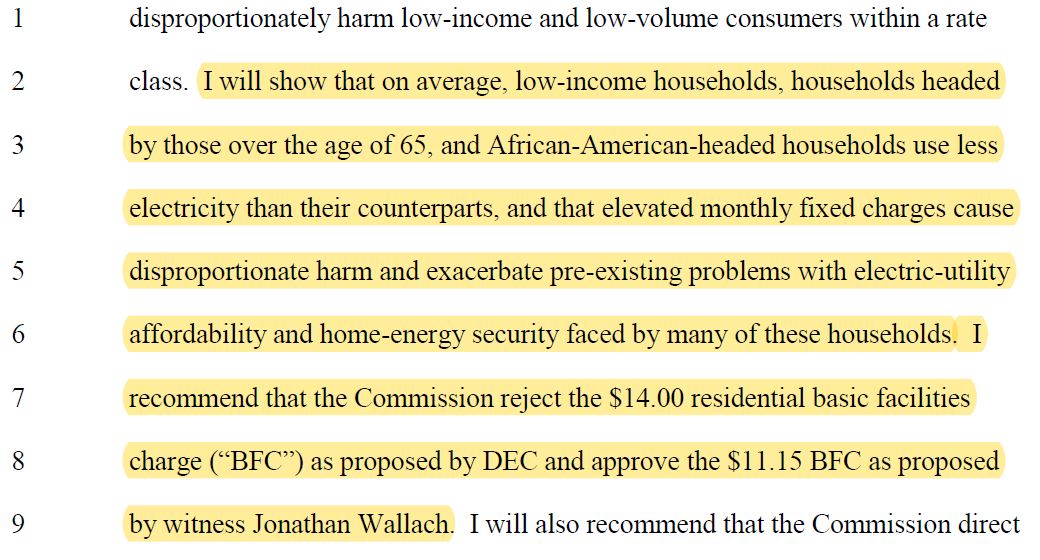Duke Energy Carolinas, in its current rate structures and its proposed rate case, is out of touch with the needs of its residential customers. Technical testimony backs up what many residents have felt for a long time: Duke is charging them more and providing them fewer benefits than large industrial and commercial customers. It’s time for the Commission to side with the little guys and reject DEC’s residential fixed fee and Grid Improvement Plan.
Maggie Shober | February 28, 2020 | Energy Policy, North Carolina, UtilitiesDiscussions around Duke Energy Carolina’s (DEC) ongoing rate case have highlighted coal ash. We agree that this is a major issue and needs attention, but there are other important aspects under consideration by the North Carolina Utilities Commission (NCUC) in this case, which we (Southern Alliance for Clean Energy, SACE) pointed out in recently filed testimony with other environmental and social justice organizations.
For context, in late 2019 Duke filed a rate case with the NCUC, who is North Carolina’s utility regulator, that calls for an increase in electricity rates. After Duke filed with the NCUC, intervenors, including SACE filed testimony to challenge all or parts of Duke’s proposal. Now, there are upcoming hearings for the NCUC to hear all sides, from all parties, on each issue in the case. We expect a decision from the Commission this summer. The Commission can choose to approve, modify or reject all or pieces of Duke’s rate case proposal.
Read highlights from testimony below.
Basic Customer Method vs. Minimum System Method
Expert Jonathan Wallach of Resource Insight, Inc. points out in his testimony that DEC bases its rates on a cost of service study (COSS) that relies “on a flawed “minimum-system” analysis to classify distribution costs.” (page 3)
He goes on to recommend that the Commission reject DEC’s current monthly basic facilities charge of $14 per month for residential customers, and instead roll it back to $11.15 to reflect “the actual cost to connect a residential customer.” (page 4)
If the Commission does not roll back DEC’s current fixed fee it is allowing the DEC to continue the following:
- The “subsidization of high-usage residential customers’ costs by low-usage customers,” (page 4)
- The dampening of “price signals to consumers for controlling their bills through conservation or investments in energy efficiency or distributed renewable generation.” (page 4)

The rest of Wallach’s testimony provides substantial analysis showing that DEC is over-allocating costs to residential customers, and thus charging them more. DEC does this by “allocating demand-related distribution plant costs on the basis of customer maximum demand, rather than based on customer demand coincident with class peaks.” Coincident peak means an individual customer’s usage at the time when the system or customer class is at maximum or peak demand. Instead, the Commission should direct DEC to allocate distribution costs based on class diversified peak demand.
Low-Income Impacts
John Howat of the National Consumer Law Center testified on the impact of DEC’s rate structure on low-income customers. His testimony shows that low-income households, households headed by those over the age of 65, and African-American-headed households use less electricity, on average than their counterparts. Thus DEC’s $14.00 monthly fixed charge cases “disproportionate harm and exacerbate[s] pre-existing problems with electric-utility affordability and home-energy security faced by many of these households.” (page 4)

Howat joins Wallach in recommending that the Commission reject DEC’s existing $14.00 monthly residential basic facilities charge and approve it at $11.15 per month. Howat also recommends “the Commission direct DEC to expand the Helping Home Fund and consider shifting it from a shareholder- to a ratepayer-funded program.” (page 4) The Helping Home Fund provides energy-saving upgrades to low-income customers at no charge.
Grid Improvement Plan
Two experts critiqued DEC’s proposed Grid Improvement Plan: Paul Alvarez of the Wired Group and Dennis Stephens, an independent consultant. Their testimony demonstrates that DEC failed to justify the proposal as improvements, and recommend that the Commission reject the entire Grid Improvement Plan. Here are some highlights:
- Alvarez points out that DEC’s request goes beyond the amounts requested in 2020-2022 to the tune of a total of $8.7 billion over 30 years.
- Alvarez further demonstrates how DEC has inflated the benefits of the proposed plan in order to attempt to justify spending such a large amount of ratepayer funds.
- Alvarez finds that the overall Grid Improvement Plan is a breakeven deal for all ratepayers and is “dramatically negative for residential ratepayers in particular.” (page 6) Most of the costs are borne by residential customers, while most of the benefits go to commercial and industrial customers.
- Stephens provides testimony that “identifies multiple deficiencies in the design, technical justification, and cost-effectiveness of many [Grid Improvement Plan] programs, and identifies a complete lack of justification for others.” (page 3)
- Stephens recommends that the Commission “establish a proceeding to develop such a process for use in developing future distribution plans and capital budgets that better align the needs of stakeholders and utilities.” (page 4)

DEC Out of Touch with Residential Customers
The themes presented here show that Duke Energy Carolinas, in its current rate structures and its proposed rate case, is out of touch with the needs of its residential customers. This technical testimony backs up what many residents have felt for a long time: Duke is charging them more and providing them fewer benefits than large industrial and commercial customers. It’s time for the Commission to side with the little guys and reject DEC’s residential fixed fee and Grid Improvement Plan.